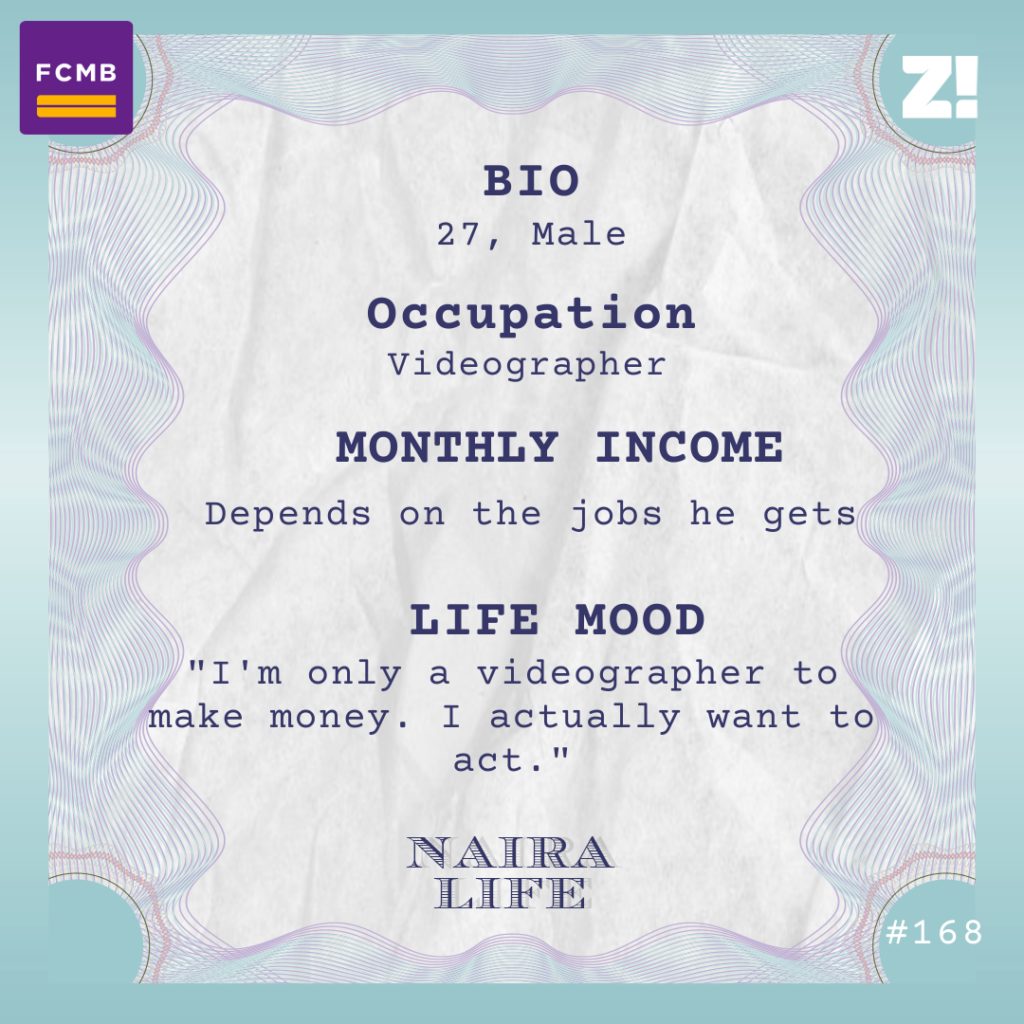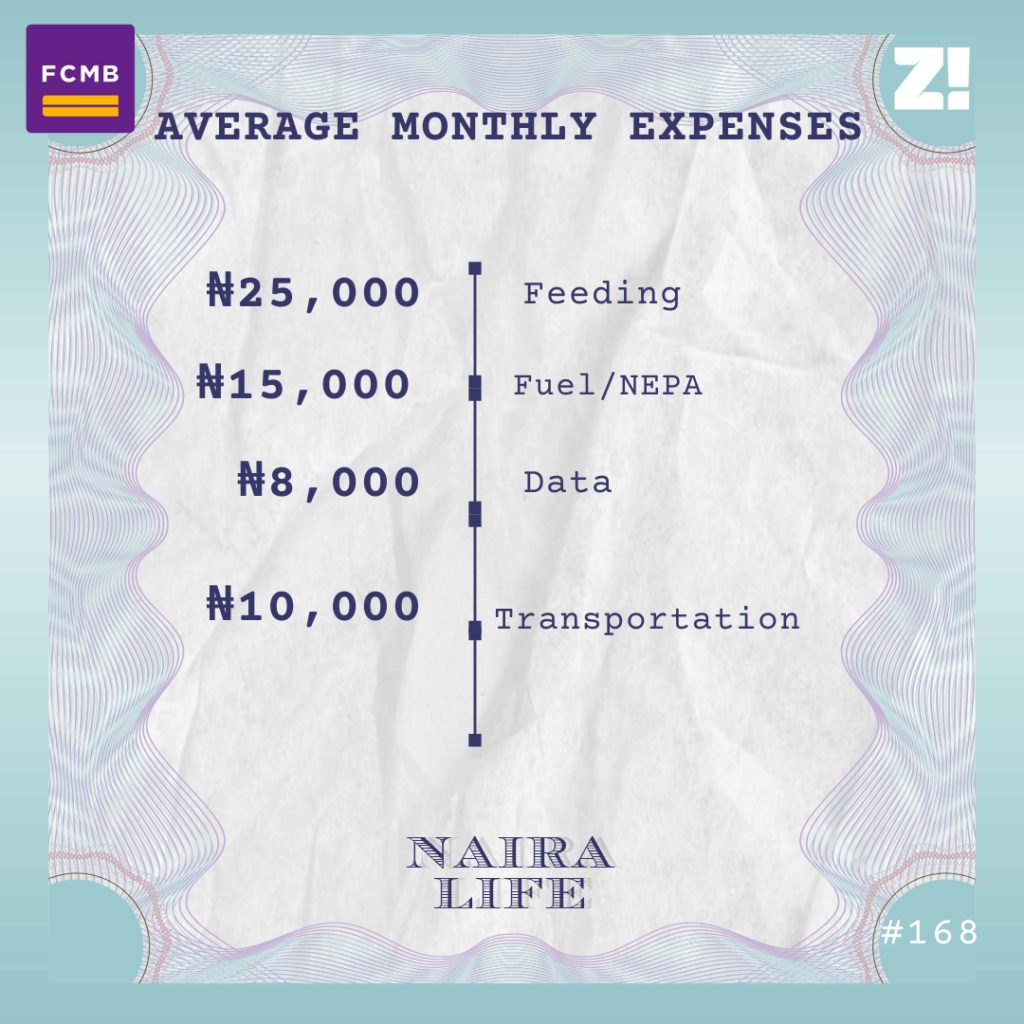Every week, Zikoko seeks to understand how people move the Naira in and out of their lives. Some stories will be struggle-ish, others will be bougie. All the time, it’ll be revealing.
No Cash? No wahala! With FCMB FastCash, you can get an instant loan of up to N200,000 without collateral or paperwork. All you need to do is dial *329*11# or log in to our New Mobile App. To learn more, please visit here.

Between 2017 and 2020, today’s subject on #NairaLife worked at his friend’s startup and earned a total of ₦60k. Now, he’s taking his filmmaking career into his own hands, and although it’s challenging, he’s hopeful.

What’s your earliest memory of money?
When I moved to Benin Republic for university in 2012, I was collecting ₦10k a month. Before then, there was the regular ₦20 or ₦50 a day for school, but that was it. Once in a while, a visitor would give me ₦1k, but my aunt would collect it to keep it for me and the money would vanish. Apart from that, I had nothing to spend money on and nobody to ask for money even if I needed it.
How come?
I grew up with my mum’s sister. My mum died when I was one and my dad was never in the picture. Nobody told me I wasn’t the child of the people I was living with until I was eight and a family friend visited. She came with her son, who was about six at the time, and while we were playing, he said to me, “You know you’re not their son, right?”
Of course, I didn’t believe him, so we started arguing. First, he asked me why I used a different surname from them. At that time, I used to write both my surname and theirs on my school books, so his argument was invalid. When the discussion was getting too long, he took me around the house to show me all the family pictures and said, “Where are you in all these pictures?”
Omo.
It was like glass shattered in my head. Everything suddenly made sense — the different surname, the fact that I was much younger than my siblings, the beating, the unending errands, the harsh words. And I began to perceive things differently, too. Now, whenever my aunt or any of my siblings said something like, “You’re so ungrateful”, or beat me terribly for the slightest mistake, I understood why.
After some time, I challenged my aunt about the information I’d received, and she replied in the most dismissive manner. “Yes, I’m your aunt. Your mum died when you were a kid. Let’s move on.”
It must have been difficult to wrap your head around everything.
I became extremely quiet and reserved. I didn’t go out to play anymore and I didn’t eat if nobody served me. I didn’t go into the freezer to take anything that they didn’t give to me, and that’s why I couldn’t ask anyone for money. I don’t know if it was all in my head, but things around the house felt different after I found out. Like they knew I knew they were doing me a favour and didn’t want to hide it anymore.
I moved to another aunt’s house about two years later to start secondary school. Things were slightly better there, but I still respected myself and mostly stayed quiet. In my free time, I enjoyed drawing, taking pictures with whatever phone I could find and turning them into movies on the house computer. I also enjoyed watching movies and writing stories.
When it was time for senior secondary school, they made me go to science class against my wishes, but by SS 2 second term, the school told them I wasn’t doing well in the sciences and had to move to art class.
What was that like?
It was what I wanted, so it was fun. I failed my first WAEC exam, and my second wasn’t great, so my aunties advised me to go to university in Benin Republic. The WAEC requirements to study there weren’t as stringent, and I already had a cousin in the school I was going to, so it just made sense.
What did you study?
Mass communication. It was a popular thing for students in art class to do. I also knew they’d touch on media — writing, scripting, cameras — which I was interested in.
How did you survive on ₦10k monthly in another country?
The naira was superior to the CFA back then, so my ₦10k was CFA 30k. All I did with the money was buy food to survive.
In 2013, during my second year holiday, I was in Nigeria and followed one of my cousins to a film set. She was a makeup artist. After waiting for about four hours, the program manager walked up to me and asked what I was doing there. When I told her, she asked me to follow her to her office to do some typing work for her. From typing, I started editing some scripts they already had and dropping some ideas to make scenes better. She liked my work, so she told me to come whenever.
Between then and 2015, whenever I was in Nigeria, I went there to work. She paid me ₦5k or ₦10k from her pocket when she could. I also acted as an extra in three movies. Each of those paid ₦10k. One other time, I said one line in a movie and made ₦20k. Those were the extras I was adding to my monthly allowance to survive because things were getting difficult at home.
How?
By my third year, my allowance was reduced to ₦5k for some months. My aunties also couldn’t afford to pay my school fees, so I owed the school. It took extreme sneakiness for me to keep writing exams until I graduated. In my school, the only way to get into the building for exams was to show your school fees receipt at the door. Because I didn’t have a receipt, I made sure I left home early and got into the building by 6 a.m., so that when the search started outside, I was safe inside. On days when the building was locked by 6 a.m., I had to find a solution like helping a lecturer carry their bag and following them through the checkpoint. Nobody will stop the person carrying the lecturer’s bag and start questioning them.
LMAO. Smart.
I also had to survive on ₦200 food every day. Bread and beans, every single day.
By my fourth year, things got even worse.
I’d stayed with my cousin up until my second year and then moved in and split rent with a few friends after. When I couldn’t afford rent anymore, I had to find somewhere to stay for free. Everyone I asked said they didn’t have space for me. Benin Republic landlords are very strict with the number of people staying in a house. After a few weeks of perching up and down and making people inconvenient, I finally decided to stay in the classrooms. I told a friend to let me come to their house to shower every morning and they agreed, so that’s what I did.
Damn.
It was terrible. There were mosquitoes, sleeping on chairs and on the floor was uncomfortable, and I had to make sure the security men that patrolled by 2 a.m. didn’t find me. After almost three months of sleeping in classrooms and lying to my friends that I was staying with other friends, one of them finally insisted on following me home and that’s when I had to tell her I was staying in the classrooms. That day, I moved in with her. That’s where I stayed until I graduated in 2016.
Did you ever pay your school fees?
Sometime in 2017, yes. That’s when the school released my transcript and certificate. The day my aunt called me to tell me she was sending the money to pay for my school fees, I almost cried. It was about ₦500k.
What did you do after university?
I moved in with a friend who owned a startup. I could have stayed at home, but I wanted to start hustling immediately. It was a startup that connected handymen to people who needed them ASAP and I was the social media manager and customer relations manager. The job paid ₦20k. After about three months, I saw that the company wasn’t profitable so I offered to stop collecting money. As long as we had food and internet at home, I was fine.
The handyman business wasn’t doing well, so we switched to a laundry service from his house. My role was customer relations too but whenever the drycleaners we hired weren’t around — which was a lot — I did the pickups, washing, ironing and delivery. Still, I was being paid nothing.
At this time, what was the plan for your career?
During the period where I was working with my friend, I opened a YouTube channel and made videos talking about football, and I did film edits and gaming edits. Nothing spectacular, just me improving my video skills.
After about a year again, we switched to a carwash business. This one did much better than the others, but I still wasn’t paid.
For how long were you working with this friend?
From 2017 to 2020. I only got paid for those first three months. Towards the end, I began to think about my life and I was wasting my time working for and believing in someone that didn’t rate me. He treated me poorly, didn’t pay me, spoke to me terribly and gaslit me whenever I tried to bring up pay. He’d say things like, “If you want to leave, leave. Someone else will replace you.” And I was afraid because I didn’t want to lose a stressful job that wasn’t paying me.
In January 2020, I reached out to the woman who gave me my first job years earlier and told her I wanted to come over and say hi. When I got to her house, she wasn’t around but I met her husband. I told him I wanted some screenwriting jobs if they had any for me and he said he’d reach out if they found something.
Did you have any experience?
In late 2019, I volunteered to help someone write a script for free. It didn’t go well because the director cut it short, but I counted it as experience.
Nice. So you left your guy in 2020.
Yep. A friend reached out to ask how I was doing and I told him my situation. He advised me to leave and move in with his family. Shortly after, the lockdown happened.
COVID was the perfect period for me to rest. I’d been doing high-pressure work without pay after suffering in university and I just needed to take my foot off the pedals. In my friend’s house, I had food, electricity, WiFi, my own room, peace, everything. After a few months of rest, I decided to take my film career seriously.
My friend’s brother had a professional camera he wasn’t using, so I collected it and started filming TikToks and short YouTube videos. Some of them did well, some of them didn’t. As I was gaining confidence in my filmmaking abilities, the woman’s husband who I spoke with reached out with a screenwriting job. It was a full movie script. I charged ₦50k. I knew I was terribly undercharging, but this was the first time I was going to make money in years and I didn’t want them to run away because I charged too much.
By the end of 2020, I’d done three film scripts where I charged ₦50k and gotten much better using a camera.
And 2021?
Early 2021, I found a $500 course online on filmmaking. I couldn’t afford it, so I reached out to an aunt abroad to pay for me. This was a huge step for me because I wasn’t used to asking anyone for money. She didn’t even ask too many questions — she paid immediately.
So I had access to endless filmmaking material, I could write better and I had a camera. I spent the early part of 2021 using everything I learned to get better. As the year went by, friends started referring me for tiny shoots here and there. Between 2021 and now, I’ve made about ₦600k from shooting at small events and writing scripts. ₦70k here, ₦120k there. It’s not a lot and it doesn’t come too often, but at least I’m making small money now.
So what are your finances like now?
Not so great. I don’t have any savings because the jobs don’t come every month, and I have to survive. I’m joining groups of creatives online so I can find more job opportunities and make more money.
What do you spend money on every month?
Most times, it’s vibes, but here’s a breakdown.

Is there something you want but can’t afford?
Of course. A camera, a laptop and a phone. The laptop I’ve been using for the past few months is borrowed, LMAO.
What are your plans for the future?
My immediate goal is to shoot at four small events every month. If I charge at least ₦70k per event, I’ll make ₦280k monthly. That’s fantastic. When I get a new camera, the quality of my videos will improve and I’ll start doing short films and cinematic weddings.
But honestly, all these videos I’m making are just so I can make money for a few years. The real thing I want to do is act. That’s my main passion.
What’s your financial happiness on a scale of 1-10?
4. Things are moving a bit too slow for me. I’m 27 and still struggling to make a living. This isn’t how I thought my life would play out. But I’m hopeful the next few years will be much better.
No Cash? No wahala! With FCMB FastCash, you can get an instant loan of up to N200,000 without collateral or paperwork. All you need to do is dial *329*11# or log in to our New Mobile App. To learn more, please visit here.





